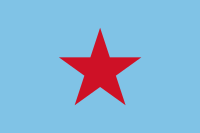National Front (Yemen)
|
Yemeni Socialist Party
الحزب الاشتراكي اليمني |
|
|---|---|
| General Secretary | Abdulraham Al-Saqqaf |
| Founder | Abdul Fattah Ismail, Ali Nasser Muhammad, Ali Salem al Beidh |
| Founded | 1978 |
| Preceded by | National Liberation Front |
| Headquarters | Aden, Yemen |
| Ideology |
Democratic socialism Social democracy Before 1990: Communism Marxism-Leninism |
| Political position |
Centre-left Before 1990: Far-Left |
| International affiliation |
Progressive Alliance, Socialist International |
| Colours | Red |
| House of Representatives |
8 / 301
|
| Party flag | |
 |
|
| Website | |
| www |
|
The Yemeni Socialist Party (Arabic: الحزب الاشتراكي اليمني, al-Hizb al-Ishtiraki al-Yamani, YSP) is a political party in Yemen. A successor of Yemen's National Liberation Front, it was the ruling party in South Yemen until Yemeni unification in 1990. Originally Marxist–Leninist, the party has gradually evolved into a democratic socialist opposition party in today's unified Yemen.
The party was established by Abdul Fattah Ismail in 1978 following a unification process of a number of Yemeni revolutionary groups in both South and North Yemen. The core of the YSP came from the Unified Political National Front Organisation – itself the result of merging three parties, namely the National Front for the Liberation of Occupied South Yemen (NLF), the Democratic Popular Union Party (Marxist) and the Popular Vanguard Party (a left-wing Ba'athist party), and from the Yemeni Popular Unity Party in North Yemen – itself the result of merging of five left-wing organisations, namely the Revolutionary Democratic Party of Yemen, the Popular Vanguard Party in North Yemen, the Organisation of Yemeni Revolutionary Resistors, the Popular Democratic Union and the Labour Party. The sole legal party in the country, it won all 111 seats in the parliamentary elections in December 1978.
In power, the YSP was beset by internal divisions. In 1980 Ismail was replaced as President of South Yemen by Ali Nasser Muhammad, who was a more moderate and conciliatory leader compared to the pro-Soviet leftism of Ismail. He sought to improve relations with South Yemen's Arab neighbours and the West. Conflict between the two factions led to the South Yemen Civil War in 1986 which led to the death of Abdul Fattah Ismail, although his ally Ali Salim al-Beidh took control of the party, while the more moderate Haidar Abu Bakr al-Attas became president. Al-Beidh and al-Attas would occupy positions in the government of a reunified Yemen until the 1994 civil war. Parliamentary elections were held in October 1986, and although the YSP remained the sole legal party, independent candidates were allowed to contest the elections, winning 40 of the 111 seats, with the YSP winning the other 71.
...
Wikipedia
